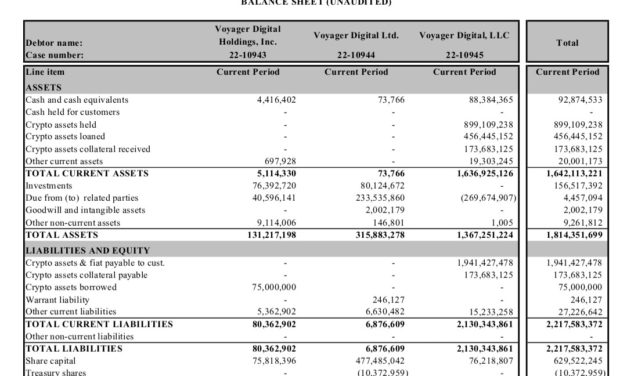Maintaining decentralization: Are custody services a threat to DeFi protocols?
Decentralization is part of the cryptocurrency industry’s core, with various protocols trying over time to achieve the level of decentralization that Bitcoin (BTC) managed to get as it grew organically from a white paper published to a mailing list to a new asset class.Decentralized finance (DeFi) protocols have brought the idea of decentralization to a new level with the use of governance tokens, which give holders the right to vote on or submit proposals regarding issues that govern the development and operations of a project. Governance tokens often represent investors’ ownership in decentralized autonomous organizations (DAOs), which operate using smart contracts.Governance tokens and DAOs are native to layer-1 blockchains that support smart contracts. Often these tokens are bought for investment purposes and kept on centralized trading platforms, which inadvertently gives centralized platforms an outsized power over the protocols they govern.Last month, cryptocurrency exchange Binance accidentally became the second-largest voting entity by voting power in the DAO behind the largest decentralized exchange, Uniswap. According to Binance’s CEO Changpeng Zhao, an internal Uniswap (UNI) transfer automatically delegated tokens.Binance later clarified it doesn’t vote with user’s tokens, but the incident highlighted a problem affecting how decentralized protocols maintain decentralization with custodial services being as popular as they are.Can custodians threaten DeFi protocols’ decentralization?Through its accidental token delegation, Binance could propose governance votes as it had 1.3% of the total supply of UNI, far exceeding the 0.25% threshold. The exchange, however, couldn’t pass votes on its own due to a 4% quorum requirement.Its influence — if the exchange chose to use it — would have nevertheless been significant. Sasha Ivanov, founder of blockchain platform Waves, said that potentially centralized control from custody service providers is a “serious issue with decentralized governance,” adding that the “promise of decentralization” is “totally unrealized with a single token governance model.”To Ivanov, there’s “nothing to stop centralized custody services from exercising their right as token holders,” which means that if Binance wishes, it could “make proposals, vote for them and change the direction of the platform and community.” Ivanov’s solution is a governance model “based on more than just token ownership.”Speaking to Cointelegraph, Hamzah Khan, head of DeFi at Ethereum scaling solution Polygon, said that it’s important to keep in mind that governance tokens have control over each protocol, with every protocol being different in how control is exercised.Khan added that UNI tokenholders, for example, cannot make changes to the protocol’s code or control users’ assets but can make other changes, such as deciding fees on an individual liquidity pool basis, for example.Daniel Oon, head of DeFi at blockchain network Algorand, told Cointelegraph that users usually monitor what centralized platforms are doing with their governance tokens and seek them over a lack of faith in supporting applications, including wallets and poor tokenomic designs.Per Oon, there are various DeFi governance platforms that “ask their users to read multiple proposals, participate in mandatory voting, do X,Y,Z, and stake their tokens” to receive yield as a reward. He added:“In face of all of these administrative tasks, the user decides to hand it over to third-party centralized platforms to handle the voting process so that they can obtain some yield ex-fees charged.”As centralized platforms are known to share generated income with users, the simplified use of governance rewards naturally attracts users to these platforms. This leaves DeFi protocols with the challenge of remaining truly decentralized.Decentralization as a goalTo Ivanov, the challenge of remaining decentralized isn’t currently achievable with single-token governance systems, as protocols using these can only remain decentralized if their token is also decentralized.Recent: Fractional NFTs and what they mean for investing in real-world assetsIvanov said that the industry is in a phase where “decentralization is very much still a goal and not a reality,” as crypto users must “interact with centralized entities to on-ramp and off-ramp into the decentralized economy.” A change will happen, he said, when “we have real-world payment systems through decentralized services.”Khan took a different view, saying that DeFi protocol teams need to remain conscious of what specifically can be changed through governance votes, adding:“As long as the protocol is open-source, permissionless, enables self-custody and has no governance control over user funds or material protocol upgrades that would affect user funds, it remains decentralized.”Khan added that veTokenomics models used by protocols like Curve and QiDao “seem to be an interesting solution to combat decentralized exchanges and other custody agents” from gaining too much control over a protocol’s governance. veTokenomics models allow tokens to be locked or frozen for a specific period of time in exchange for non-transferable veTokens that can be used in governance.Put simply, veTokenomics forces centralized entities not to participate in governance, as locking tokens would reduce the liquidity they need to process user withdrawals. Moreover, the period in which tokens are locked also influences voting power. Khan added:“veTokenomics does seem to protect against centralized custodian governance attacks, whereby token holders are able to ‘lock’ their token in the protocol to participate in governance. For example, if a user locks up a token for 4 years, they receive 4x the voting power.”Unlocking tokens earlier than expected, he said, typically results in a 50% penalty, while voting power boosts decay along with lock-in periods.Oon noted that centralized entities “have been observed to pursue more profitable paths such as lending out those tokens to other organizations” that provide a yield equivalent or higher to that of a DeFi protocol’s voting sessions, which leads to a lower amount of committed votes.As those holding their tokens on centralized platforms do not participate in governance, the voting power of those who do is boosted. When centralized entities do vote directly, he added, general observations “have shown that the centralized entity will usually vote in favor of higher emissions and the like, which increases fees generated.”Such a move could have unpredictable consequences. Michael Nonaka, a partner at multinational law firm Covington and Burling, told Cointelegraph that a DeFi protocol can be decentralized even if the voting power is concentrated in a small number of token holders, adding:“Problems arise if a large token holder is able to wield enough influence to alter the trajectory of the DeFi protocol to reflect the holder’s objectives, rather than the objectives identified by the protocol to spur interest in the token and protocol. “Nonaka noted that in such a scenario, other holders may sell their tokens over the belief that they no longer represent the value of the protocol’s founder or tokenholders.As it stands, any action centralized entities take could easily affect decentralized governance. Most centralized entities seemingly do not participate in on-chain governance but simply safeguard users’ tokens on their platforms.Influencing decentralized governanceIf centralized entities do attempt to influence a protocol’s governance — either for their own gain or because they believe it’s the right thing to do — there are several options available to tokenholders.Khan believes that one option is to no longer participate in that protocol. He said:“One of the primary principles of Web3 and DeFi is the right to exit and the right to fork — users are not required to continue using a specific DeFi protocol if they don’t agree with its governance.”Khan elaborated that if centralized actors leverage their custodied voting power for malicious intent, users can “simply withdraw their funds and developers can fork the code to create a governance structure that is more aligned with the values of the users, developers, investors, and other stakeholders.”Anton Bukov, co-founder of decentralized exchange (DEX) aggregator 1inch Network, seemingly agreed with Khan, stating:“DeFi users should understand that depositing their digital assets to custodian platforms also gives voting power to these platforms. I want to believe that if those platforms would take any unexpected actions with deposits, this would lead to reducing deposits and user base.”Speaking to Cointelegraph, David Weisberger, CEO of smart order routing software provider CoinRoutes, said the actions of regulators around the world could also heavily influence decentralized governance. If “regulators demand visibility into the controlling owners of protocols,” concentration on custody service providers could “help the protocol adapt.”Recent: Some central banks have dropped out of the digital currency raceOKCoin chief operating officer Jason Lau told Cointelegraph that, over time, capital flows increase as more financial institutions get involved in DeFi. He predicted that services will likely adapt to the space rather than influence it to change:“Custody services shouldn’t be seen as the primary challenge to DeFI. DeFi proponents will likely grapple with user trust failures, as seen with the Tether scandal, and likely government regulation that will change how DeFi operates. Instead, we have seen custody services adapt to include DeFI principles in their services.”The emergence of decentralized custody solutions also means institutional investors can self-custody their funds while allowing protocols to remain decentralized, Lau added. Nevertheless, using regulated custodians can “enhance the credibility of a Defi protocol,” he said, and could both improve security while ensuring transparency.There’s still a lot left to be figured out, as decentralized protocols are, just like cryptocurrencies, the cutting edge of financial technology. Engaging in decentralized governance, for now, can be seen as a brave endeavor as tokenholders explore the unknown.
Čítaj viac






